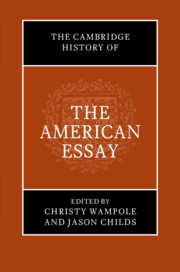Book contents
- The Cambridge History of the American Essay
- The Cambridge History of the American Essay
- Copyright page
- Contents
- Acknowledgments
- Notes on Contributors
- Introduction
- Part I The Emergence of the American Essay (1710–1865)
- 1 Essays to Do Good: Puritanism and the Birth of the American Essay
- 2 Prattlers, Meddlers, Bachelors, Busy-Bodies: The Periodical Essay in the Eighteenth Century
- 3 The Federalist and the Founders
- 4 American Nature Writing: 1700–1900
- 5 The Essay and Transcendentalism
- 6 Old World Shadows in the New: Europe and the Nineteenth-Century American Essay
- 7 Poet-Essayists and Magazine Culture in the Nineteenth Century
- 8 Antebellum Women Essayists
- Part II Voicing the American Experiment (1865–1945)
- Part III Postwar Essays and Essayism (1945–2000)
- Part IV Toward the Contemporary American Essay (2000–2020)
- Recommendations for Further Reading
- Index
3 - The Federalist and the Founders
from Part I - The Emergence of the American Essay (1710–1865)
Published online by Cambridge University Press: 28 March 2024
- The Cambridge History of the American Essay
- The Cambridge History of the American Essay
- Copyright page
- Contents
- Acknowledgments
- Notes on Contributors
- Introduction
- Part I The Emergence of the American Essay (1710–1865)
- 1 Essays to Do Good: Puritanism and the Birth of the American Essay
- 2 Prattlers, Meddlers, Bachelors, Busy-Bodies: The Periodical Essay in the Eighteenth Century
- 3 The Federalist and the Founders
- 4 American Nature Writing: 1700–1900
- 5 The Essay and Transcendentalism
- 6 Old World Shadows in the New: Europe and the Nineteenth-Century American Essay
- 7 Poet-Essayists and Magazine Culture in the Nineteenth Century
- 8 Antebellum Women Essayists
- Part II Voicing the American Experiment (1865–1945)
- Part III Postwar Essays and Essayism (1945–2000)
- Part IV Toward the Contemporary American Essay (2000–2020)
- Recommendations for Further Reading
- Index
Summary
This chapter considers the Federalist Papers, an essay collection by James Madison, Alexander Hamilton, and John Jay under the pseudonym Publius and advocating for the ratification of the US Constitution starting in 1787. Beginning with reflections on the origins of the word essay and its many meanings, particular attention is given to one of these: the essay as an attempt to do something, either as an action or through writing. A central question guided the ratification debate: Could there be an essay – a concerted effort – striving toward just representation? In the passionate debates between Federalists and Anti-Federalists, a secondary, hidden debate was simmering: In what kind of prose should arguments be articulated? Was the essay, with its notoriously loose style and method, up to the task? In its ability to accommodate multiple, sometimes contradictory viewpoints in the same textual space, was it ideal for puzzling out the nation’s future? Or was it too distracted, a form of bad thought scribbled in haste, unsuited for such a momentous task? This chapter shows the correlative features of striving toward a political ideal and the striving involved in essayistic writing.
Keywords
- Type
- Chapter
- Information
- The Cambridge History of the American Essay , pp. 46 - 60Publisher: Cambridge University PressPrint publication year: 2023

